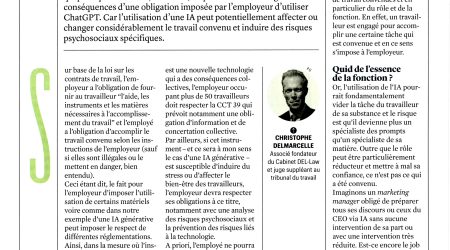Remote recruitment
Posted the 11 December 2020Teleworking also means remote recruitment management with many legal and practical questions
The collective labor agreement (CCT) 38 sets the legal framework for recruitment and selection of workers, even for remote hiring. However, other regulations must also be considered, such as privacy laws, language use, or civil law for signing contracts remotely.
Firstly, the CCT requires employers to provide candidates with sufficient information about the job offered, including where the position is to be carried out. In the current circumstances, clarity is needed regarding teleworking, especially after the health crisis. If physical presence is expected, the contract should ideally specify the regular workplace.
The interview
Secondly, the candidate’s privacy must be respected, particularly when recruitment occurs remotely. Recording a video interview is generally allowed, but it is better to obtain the candidate's consent. Care should be taken when sharing confidential information, as candidates can also record or take screenshots. A confidentiality agreement may be required in sensitive cases.
Thirdly, with multiple participants, storing emails, reports, comments, and CVs on different computers, compliance with GDPR (General Data Protection Regulation) becomes more complex. It is recommended that all internal and external participants delete everything after the recruitment process, keeping only one copy on a secure site.
Fourthly, compliance with language employment laws is essential.
Collecting information
If an in-person meeting is not possible, recruiters often seek more references on candidates, including reviewing more online sources. This is allowed as long as the candidate's privacy is respected. The investigation should remain proportional and related to assessing the candidacy based on job needs, using only public sources.
Legal provisions govern the use of private investigators.
In theory, an employment contract can be concluded orally, so written contracts are not mandatory, except for fixed-term, part-time contracts, or telework agreements. An electronic contract can be used, or a scanned copy of a signed contract. In the worst case, this will serve as an initial proof, and article 1322 of the Civil Code can be referenced if there is no dispute. For fixed-term and part-time contracts, the safest approach remains paper signatures before or at the time of hiring.
Finally, for automated profiling, no decision can solely be based on the automated processing of personal data to evaluate performance, behavior, or preferences without informing the subject and allowing them to object or require to be heard.
Related articles

Is an employer allowed to mandate the use of artificial intelligence tools by employees ? (Trends, 17-07-2025)

Caution if a former colleague opposed to your employer asks you to testify in their favor
